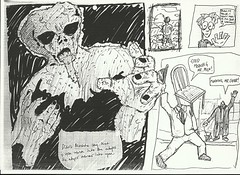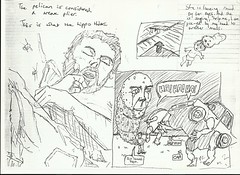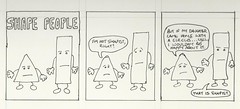Hello you.
Welcome to the sixth edition of Comics are Magic (click link for the archives). This is just a short one because its been a while. It concerns the magical influence of classic Silver Age story The Flash Stakes His Life On You! from The Flash#54 by way of two modern magicians and comics creators.
The first, Alejandro Jodorowsky is probably best known for his films, the alchemical allegories El Topo, The Holy Mountain and Santa Sangre. For those unfamiliar with his work here’s the trailer for his masterpiece The Holy Mountain. That’s subjective of course, and they are all stunning, mind-warping films, but The Holy Mountain is I think clearest in its alchemical intent.
Jodorowsky started out as in theatre, co-founding the Panic Movement in 1962 which drew on Antoin Artaud’s Theatre of Cruelty and staged violent and surreal performance pieces. From wikipedia:
The movement’s violent theatrical events were designed to be shocking,[2] and to release destructive energies in search of peace and beauty. One four-hour performance known as Sacramental Melodrama was staged in May 1965 at the Paris Festival of Free Expression. The “happening” starred Jodorowsky dressed in motorcyclist leather and featured him slitting the throats of two geese, taping two snakes to his chest and having himself stripped and whipped. Other scenes included “naked women covered in honey, a crucified chicken, the staged murder of a rabbi, a giant vagina, the throwing of live turtles into the audience, and canned apricots.”
In his excellent memoir The Spiritual Journey of Alejandro Jodorowsky he describes how he moved to Mexico to undergo initiation with a number of female shamans. Like Alan Moore, Jodorowsky views art and magic as inseparable. He later combined theatre, magic and psychotherapy in his practice of psychomagic where the patient’s personality and family tree are studied to come up with symbolic performances to be acted out, based on the principle that the unconscious mind accepts symbolic acts as fact. Here is one example of many from his book on the subject (page 132):
A young Chantal, at four years old, found herself placed in a school directed by the sister of the mother of her mother…The great-aunt sadistically tyrannized the child. In working with me, Chantal discovered all the hate she held towards to this woman. She could not forgive her, and she had no way to avenge her because the torturer was no longer in this world. So I advised her to go to the grave of this woman and, once there, give free rein to this hate: that she kick, scream, piss, and defecate on the tomb, but provided that she dedicate herself to paying close attention to her subsequent reactions to her demonstrations of vengeance. She followed my advice, and after letting off some steam atop the sepulcher, she felt a deep desire to clean it up and cover it with flowers. And, little by little, she couldn’t help but surrender to the evidence that she, in fact, felt love for her great-aunt.
A true polymath, Jodorowsky has also developed his own reconstruction of the Tarot of Marseilles, which he summarises in the video below:
Jodorowsky has worked regularly in the comics medium. His earliest comics work included the strip Fabulas Panicas, which debuted in 1967 (and ran to 1973) in the Mexican newspaper El Heraldo de México. Below is one of these strips. There are many, many more over at fabulaspanicas.blogspot.co.uk, dedicated entirely to reproducing the strip and well worth your time. Even if like me you don’t speak Spanish.
Jodorowsky would go on to produce a series of comic books, often in collaboration with late, great Mobius. (Incidentally the two creators met when Moebius produced concept art for Jodorowsky’s unfilmed adaptation of Dune. More intriguing detail and art from the Dune-that-could-have-been here.) The most famous of these collaborations is perhaps The Incal and its spin-offs spinoffs The Metabarons and The Technopriests. Laura Hudson at comicsalliance notes the high praise other comics creators have for it and describes the series this way:
The Incal is not only a marvel of intricate visuals, but also of ideas, set in a vast galactic empire where luminescent aristocrats hiding ugly secrets cavort with dog-headed men deep in the depraved bacchanalia of the Red Ring, technorats roam the garbage plains in terrible swarms that multiply in proportion to your fear, and enormous floating citadels open like flowers into mechanical spiders the size of skyscrapers.
It is a strange, dazzling world that Moebius and Jodorowsky launch us into at breakneck speed, and never let up as they keep laying down new innovations, characters, dangers, plot twists and stunning, perfectly framed visual spectacles like men with hands full of infinite trump cards. In one small corner of this universe, a lowly private detective named John Difool — based on The Fool Tarot card — finds himself in possession of a tiny, mysterious pyramid called the Incal, an object of such power that it inspires a galaxy-wide manhunt and transforms him into an unlikely (and unwitting) messiah.
Extracting the various occult references and tart symbolism in these comics would require a fair amount of study and take us on a diversion from the actual focus of this post so I leave that to others and, as always, would love to hear of any such investigations. What can be said for now is that the polymath Jodorowsky sits within a tradition of comics creators as magical practitioners that has been highlighted repeatedly throughout this series of posts. In an interesting interview for The Comics Journal, Joe McCulloch asks Jodorowsky if he considers himself a ‘magician of comics'”
MCCULLOCH: Once, when asked if you were a magician of cinema, you replied that you had made very few films, and that film-making is like karate, where you must punch and punch and punch to achieve magic. Do you feel you are a magician of comics?
JODOROWSKY: I feel myself like a genius and a sacred whore.
MCCULLOCH: Do you read many new comics, and are there any you’ve particularly enjoyed?
JODOROWSKY: Prince Valiant, graphic novels of Will Eisner, [Katsuhiro] Otomo’s Akira.
MCCULLOCH: Finally, is there a message you would like to give to artists making comics today?
JODOROWSKY: Kill Superheroes !!! Tell your own dreams.
Many readers are very happy to dream of superheroes instead of course, but Jodorowky’s provocation can be left for now. What interests us here is an article he wrote in 1968 for the Spanish science-fiction magazine Neuva Dimension. Maxwell Yezpitelok at comcibulletin.com posted a translation of the article, which concerns issue 54 of The Flash, containing the story The Flash Stakes His Life On You!
Jodorowsky describes it as, “the most important literary argument of recent months…worthy of being placed beside works like The White Dominican by Gustav Meyrink or Mount Analogue by René Daumal”. For a synopsis, here’s Grant Morrison, from his book Supergods:
One day The Flash fell afoul of a bad bastard who’d invented a new weapon that caused people to forget about anyone caught in the path of its ray. He tested the device by turning it on his pet cat Jessica, whom everyone promptly forgot, causing the animal to vanish forever like a tree not falling in a nonexistent forest…It wasn’t long before the weapon was turned on the Flash himself. With no one to remember or recognize him, he began to dissolve like a smoke ring…
how could our hero get out of this ultimate trap? One little girl, whose dolly he’d rescued from the river that day, still somehow remembered the Flash, and through her he began to reassemble his ontological status-just in case you were wondering. (Supergods, page 80)
And back to Jodorowsky for the conclusion:
After approaching her Flash solidifies and becomes his old self. But when he moves away he weakens again. He depends entirely on the girl’s presence. He adopts her as his helper and, thanks to the superspeed he acquires in her proximity, writes thousands and thousands of letters explaining what’s happening to him. These letters he distributes among the citizens. Upon reading the letters they are convinced and decide to believe in the hero again. He goes back to normal and captures the strange gentleman, who is an international thief.
For Jodorowsky, the villains words to the Flash regarding his predicament are key to the story working as a ‘parable’ (“we can’t avoid calling it that” he states):
The unique device that I perfected [. . .] spread a certain radiation over this city! [. . .] It erased all memory of you from the minds of the people here! And since our own belief in ourselves is based on how others feel about us — you began at once to lose your own identity! Your contact with reality was shattered! Right now there’s only one thing that’s keeping you from disappearing altogether — the fact that only one person still believes in you — namely me! [. . .] When I turn the radiation on myself, Flash, the last person in this city will have ceased to believe in you — and a short while afterward you’ll vanish completely and forever!”
Jodorowsky is struck by the villain’s physical resemblance to the Russian mystic G. I Gurdjieff but also the manner in which “the content of the parable could very well belong to the philosophy of this enigmatic being.” (Coincidentally, one of Jodorowsky’s female spiritual teachers on his search for illumination was Reyna D’Assia, the daughter of Gurdjieff)
Gurdjieffs system, as explained by nthmind hero Robert Anton Wilson:
holds that human beings are evolving from mammalhood to immortality. Almost all of us, he says repeatedly (and with evident joy in annoying our self-esteem), are still on the mammalian level—robots controlled by conditioning. We think we are conscious, but we aren’t. We are asleep, hypnotized, sleep-walking—the metaphors vary, but they all mean that we can’t see outside our conditioned reality-tunnel. When we begin to awaken, we perceive that the world is nothing at all like the myths and superstitions our society has imposed on us.
Jodorowsky has more to the say on the matter of The Flash #54 as Gurdjieffian parable, and makes reference to Zen buddhism on the way. I highly recommend reading the full article at comicsbulletin. For our purpose however the following paragraphs will suffice:
The teacher, wanting the character to be conscious of his inner emptiness, proves that his existence, by being so “from the skin outwards,” depends on others. If the others stop paying attention to him, he does not exist, the reason being that all his values are based on the opinions of the rest. Flash lives not for himself, but for others. He exists in those who see him…By no longer being seen and admired, the artificial self behind which he hides evaporates. By becoming naked, depending on his own values, he realizes that he is nothing. Gurdjieff says that man is born without a soul and that through huge and systematic efforts he must create it for himself. Flash never made an effort to create himself.
In fact The Flash Stakes His Life On You appears to be some kind of strange attractor. Whether they were familiar with Gurdjieff or not writer John Broome and artist Carmine Infantino created a story that played a significant role in Grant Morrison’s creative visions and magical worldview. Morrison has written that, ” it’s one of the first stories I remember as having a profound impact on my young mind. I can trace many of my own obsessions and concerns as a writer back to this particular root” (Supergods, page 84). These thematic concerns are crystallised on the cover above: “this was the first time a superhero looked out from the flat picture frame into a theoretical higher dimensional space” (page 85). There’s more on Morrison, magic and comic book dimensionality in previous installments of Comics are Magic so I won’t elaborate on that here.
Instead we can close with Morrison’s reading of The Flash#54’s parable, a more optimistic reading than Jodorowosky’s that takes the psychedelic experience rather than Gurdjieff as its explanatory model:
An adult eye may judge the simple morality, the unlikely motivations, and find Broome’s story light. It’s true that there’s all too often an airy, affectless tone to Broome’s work, but this one has deep resonance. It showed in precise detail the breakdown of the superheroic hard body that was occurring everywhere in the Silver Age. It depicted the end of the trip, the spacey, terrifying loss of self and volition that would be experienced by so many young people unprepared for the psychoanalytical effects of Albert Hoffman’s chemical child in a time of war. And it showed them that the only way back was through kindness, connection, and community. (Supergods, page 86)
So there we have it. For one magician The Flash Stakes His Life On You! is a Gurdjieffian parable about the Flash’s inability to attain full consciousness of himself because his reliance on others memories of him serves only to recreate his old, mechanical, artificial self. For another the story is a psychedelic allegory about the importance of connection and a primer in comic-book metaphysics.
At any rate The Flash Stakes His Life On You! remains a great example of Phillip K. Dick’s observation that “the symbols of the divine initially show up at the trash stratum”, seemingly ripe for mystical interpretations. If anyone has evidence of Alan Moore reading this issue then we’ll have a magician/comics writer hat-trick!










March 7th, 2013 at 22:29
Comic book metaphysics grabbed me at a very young age while reading Casper the Friendly Ghost. I always preferred Spooky.